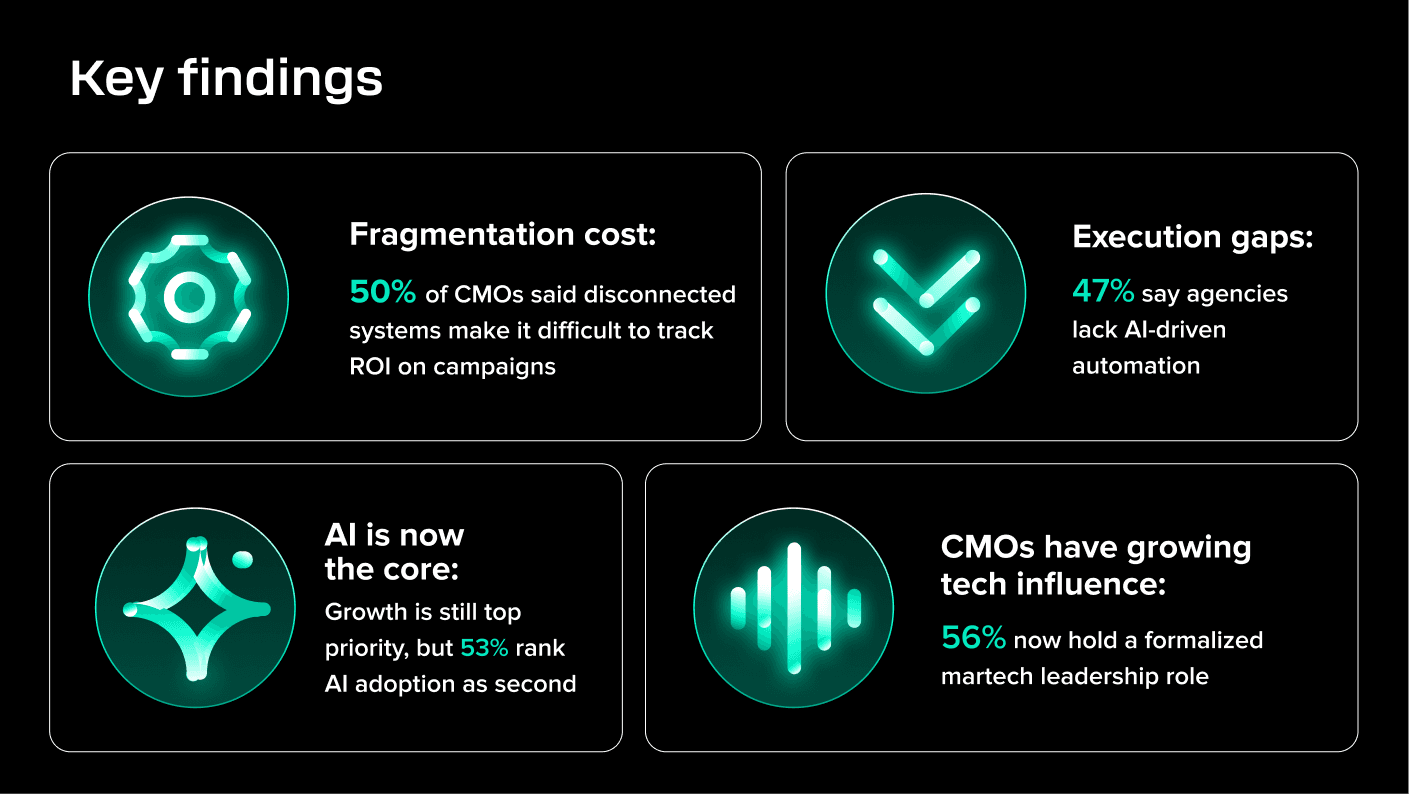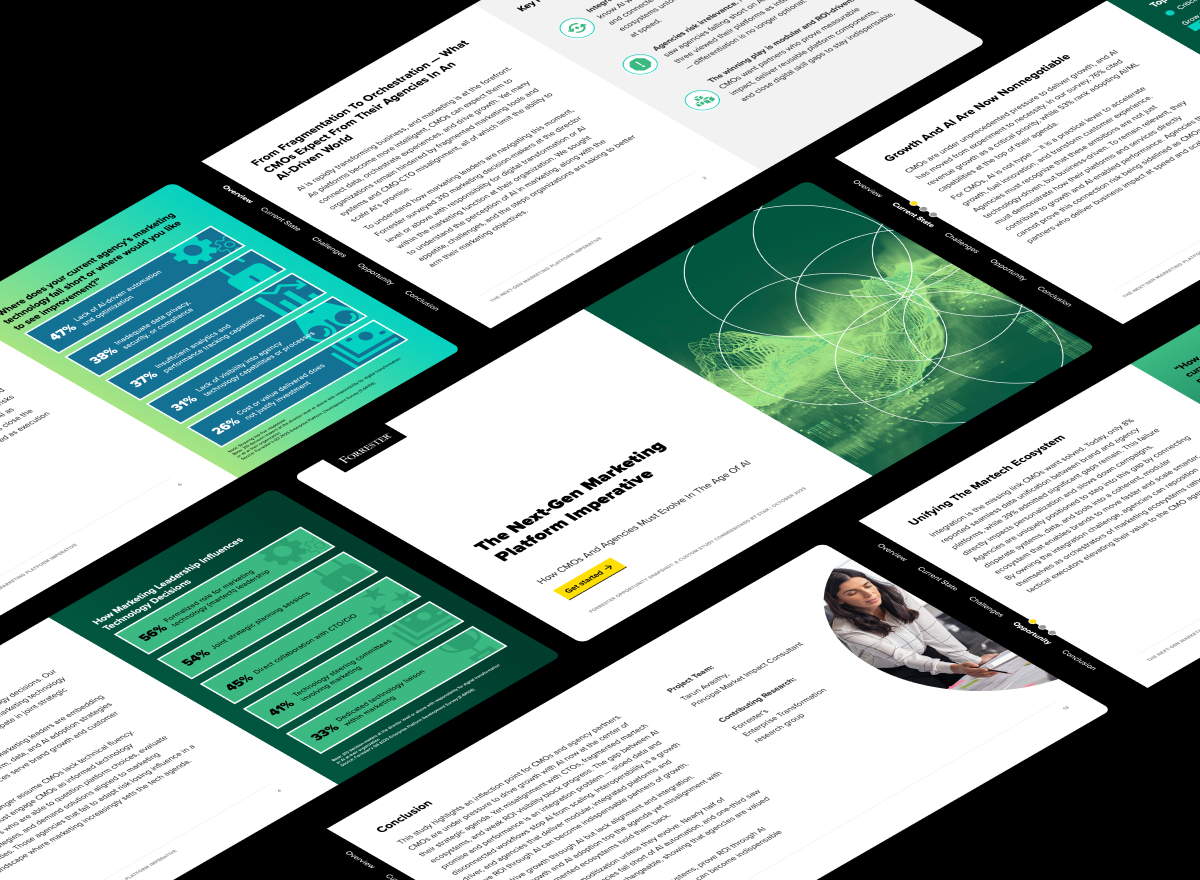The role of Chief Marketing Officer has changed markedly in recent years. In addition to brand building, today’s CMO also oversees customer experience and growth initiatives that demand far more than traditional creative and campaign execution. As a result, agencies have had to rapidly reinvent themselves to satisfy the new, tech-driven priorities of the marketing department.
To better understand the changing relationship between brands and their agencies, we commissioned an in-depth, independent study by Forrester. The findings revealed just how foundational technology has become to modern marketing teams, with some 56% of marketing leaders taking MarTech leadership roles and 54% of them taking part in strategic planning with their Chief Technology Officers.
The Forrester study, which draws on survey data from more than 300 CMOs and senior marketing leaders at brands with $1bn+ revenue, found that 76% of CMOs prioritise revenue growth as their top strategic focus and their strategies for achieving this growth are becoming ever more reliant on technology.

Learn what +300 enterprise CMOs expect from their agency partners and their technology.
The AI era: new challenges, new expectations for CMOs
Growth remains the clear imperative for CMOs, but their methods for achieving this growth are swiftly changing with 53% naming AI adoption as their top priority and a near equal number selecting Customer Experience (52%). This marks a profound change in mindset: CMOs increasingly view AI not as a “nice-to-have” innovation, but as a core enabler of growth.
The pace is remarkable. Machine learning already powers 17% of marketing operations — double the share since 2022 — and is projected to reach 44% within three years according to Duke University's Fuqua School of Business.
Having spent more than two decades supporting brand and agency growth with technology, the marketing ecosystem has never been more fragmented. There are now more than 1,500 solutions to choose from, with a market capitalization of $557.94 billion and growing! Fragmentation doesn’t only create pain from juggling vendor dashboards and partnerships. Forrester's data indicates that 50% of CMOs say disconnected systems make it difficult to track ROI on campaigns.
This lack of visibility undermines Marketing's credibility in the boardroom and the case for greater investment, in turn creating a barrier to scaling the AI tech and initiatives CMOs believe are critical to growth..
We're also seeing a deeper evolution in marketing leadership. CMOs are not just custodians of their brands, they are increasingly becoming custodians of end-to-end customer experience (as experiences are manifestations of their brands). This means CMOs who can orchestrate complex tech stacks and customer data have growing influence.
For CMOs without these capabilities, roles such as Chief Experience Officer, Chief Growth Officer or Chief Customer Officer tend to fill this gap and connect customer engagement with financial results.

Changing nature of client and agency relations
Against this backdrop, we see agencies developing their proprietary platforms, technologies and data solutions to continue to provide value to CMOs and today's tech-led marketing operations. Technology-driven capabilities – data management platforms, analytics, automation tools and AI content generators – have all become a centerpiece of what agencies offer.
Both brands and agencies recognize that technology integration and data are crucial to marketing success, but their expectations are not always aligned.
Many agencies have invested heavily in proprietary platforms and AI solutions to sell to clients, and CMOs both want and expect this, with 80%+ agreeing or strongly agreeing that agency technology is considered critical in partner selection and retention.
However, CMOs increasingly seek practical outcomes like speed, efficiency and ROI from these tools ahead of glossy new features and this has created some tension in the partnership: if an agency’s AI or automation platform truly makes marketing more efficient, CMOs ask why costs aren’t dropping or results aren’t improving commensurately, with some marketers growing skeptical. In our study, only 18% of CMOs strongly agreed that agencies deliver the AI capabilities they promise, and 32% view their partners’ systems as interchangeable.
Forward-looking agencies are responding by making their solutions modular and interoperable, emphasizing compatibility with common martech systems instead of forcing clients into closed ecosystems, and there are sound economic benefits to this approach.
Masterclass: The AI divide: Rethinking CMO–Agency partnerships for growth
Catch up on our webinar with guest Forrester analyst on how AI and platform technology is changing agency client relations
The link between agency client integration and growth
Most companies are misdirecting their AI investments. In fact, in a recent MIT study, only 5% of projects successfully scaled and delivered measurable financial returns. Most AI applications help knowledge work and automate manual processes. But extracting measurable value from technology at an organisational and sector level requires a new way of looking at how work is done.
The gap between AI promise and AI performance is largely a problem of integration. Siloed data systems prevent AI models from accessing the most relevant datasets needed for accurate predictions. Systems are disconnected so staff have to manually move information from AI insights to execution, and this slows things down.
When components work together, they grow faster. With AI, brands finally have the opportunity to deliver connected and personalised experiences. But this is only possible with an integrated ecosystem that connects channels, creatives and data with an AI-powered orchestration that adapts messaging and offers based on comprehensive customer profiles.
Agencies must position themselves as strategic partners that leverage proprietary platform technologies to elevate brand experiences. Clients may fear vendor lock-in, but the best platforms are interoperable and support collaboration with other vendors and tools.
What's next for agency client integration?
Those who continue to operate in silos will struggle to deliver the growth that Boards now demand. The Forrester study makes it clear that integration and interoperability unlock true growth for CMOs and help agencies to stay relevant - when the buying and supply side of marketing function as an integrated ecosystem, they deliver the seamless experiences customers expect.
To succeed, brands should invest in partnership models that leverage agency expertise and proprietary data together. Now is the moment to reimagine the agency client relationship as a true growth partnership.
Most importantly, technology must be viewed as an enabler, not an end in itself. CMOs should start by defining the business outcomes they want to achieve and then work backwards to identify the right capabilities, partners and platforms. By focusing on strategic objectives instead of chasing tools, marketing can build the connective tissue needed for real, measurable growth and long-term advantage.






